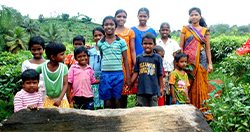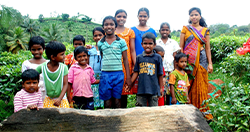By HL Ananda Piyankara, a One Young World Ambassador and the founder of the Ant Commodity.
On August 7, 2019, Sri Lankan Customs detained our shipment of Ceylon cinnamon powder bags that was headed to the Amazon warehouse in Illinois, USA. The reason for the detainment was the printed statement on the reverse side of the product label:
“In Sri Lanka, most of the labour workforce consists of Indian Tamils who came to Sri Lanka during the days of British rule. Most of them still lack Sri Lankan citizenship, which prohibits them from enjoying free education, free medicine and other benefits that full citizens enjoy. For this reason, we have started a project to empower the children of our working communities by providing them with the best education we can. We believe that empowering a child is like empowering a generation....”
According to the customs officials at Colombo Airport, this statement casts Sri Lanka in a negative light, thus they detained the shipment. However, the Sri Lanka Customs Act doesn’t grant Customs this authority, and since we are not acknowledging any wrongdoing, the shipment has been laying in the Customs yard for over one month now. This was an act of “bureaucratism,” a common problem faced by entrepreneurs in developing countries who do not have any political backing. These real problems faced by entrepreneurs are not factored into any of indexes such as “Ease of doing business index.”
Families are sold from one plantation to another
We placed the above statement on the product label as a result of an encounter we had with six Indian Tamils from Sri Lankan families who joined our Sri Lankan farm in early 2015. In the Sri Lankan tea industry, families living on a plantation can be purchased. The plantation owner then becomes the owner of these families. The purchase amount is the debt that the family owes to the plantation and to the plantation shop from which they buy their day-to-day items from. In our case, our farm paid a sum of LKR 182,000 (GBP 814) to the owner of the plantation where they worked, and these six families were brought to our farm.
This has been the norm for Sri Lankan plantations over the past 150 years. Because 4-6 member families make an average income equivalent to LKR 1,200 (GBP 5.35) per day, there is no practical way for these families to settle their outstanding debt, thus they are trapped in the cycle of providing cheap labour to an industry that’s valued at US$ 1.37 billion (2% of Sri Lanka’s GDP).
Free education not for everyone
Of the 6 Sri Lankan Tamil families that moved to our farm, there were 15 children ranging in age from 3 months to 16 years old. While the parents were at work doing hard labour (plucking tea), the older children would care for the younger ones, prepare food and clean. As there was no parental supervision, the young girls were often subjected to sexual harassment and abuse, which often resulted in pregnancy. This was shocking to us, so after much deliberation, we started a school for the children of the plantation workers. Because of the limited resources we had, the lessons were taught in the back of a Benz lorry; hence, the school was named “Lorry Body School.”
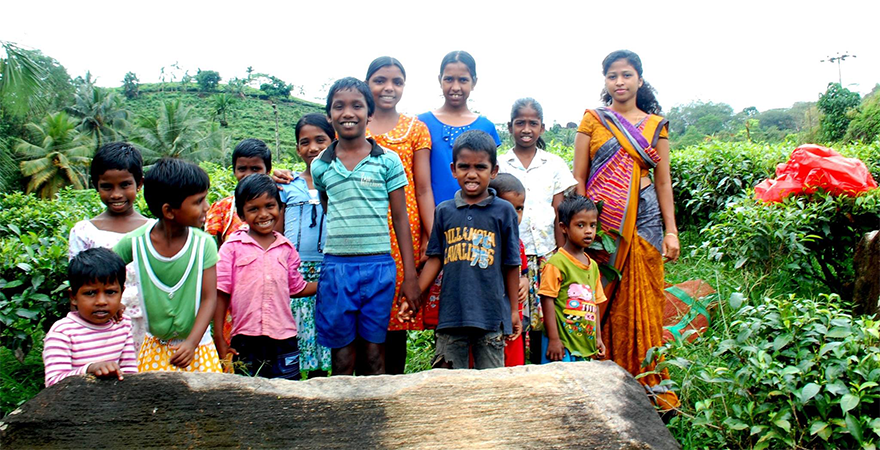
Due to a complaint made by a local resident, the Sri Lanka Department of Education came to investigate the school and ordered the children to be sent to two local schools. At these local schools, the children were continually mistreated, primarily because of their social status, ‘children of plantation workers’ and they were lacking in age-appropriate knowledge. Because of this lack of acceptance and hardships faced, all the children eventually stopped attending school. The Department of Education was aware of the situation, but never made any effort to make the schools more accommodating for the Tamil children. Furthermore, when the children stopped attending the schools, the Department turned a “blind-eye” to the situation.
Sri Lanka provides free primary and secondary education and by law children under 16 must attend school. Yet, if you visit any plantation, it is common to see many young children who should be in school, not attending. It is pitiful that the educational laws are not enforced for the poor and disadvantaged Sri Lankan Indian Tamil children.
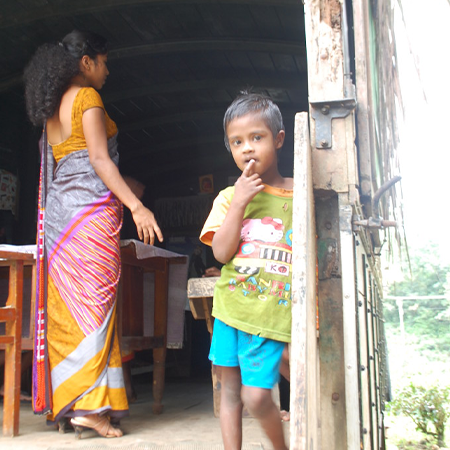
Health and Citizenship
In 2015, Rani Ramer, a woman from the group got pregnant with her 4th child. Until the 5th month of the pregnancy, the two local government hospitals, and local midwives refused to provide the mother with prenatal services because she didn’t have a Sri Lankan ID. It was only after our involvement that the mother was admitted to the national hospital.
The mother delivered a boy and gave us the honour of naming the child (pictured below). We proposed the name Chogam, the acronym for the Commonwealth Heads of Government Meeting (CHOGAM) held in Sri Lanka as a reminder that these communities become powerless because of the mess created by the royal family of the United Kingdom.
The doctor who delivered Chogam performed the LRT surgery (Laparoscopic Tubal Ligation) on the mother because of her weak health condition. Surprisingly, after the LRT operation, the same mother delivered another baby girl who was named Sara Chogam.
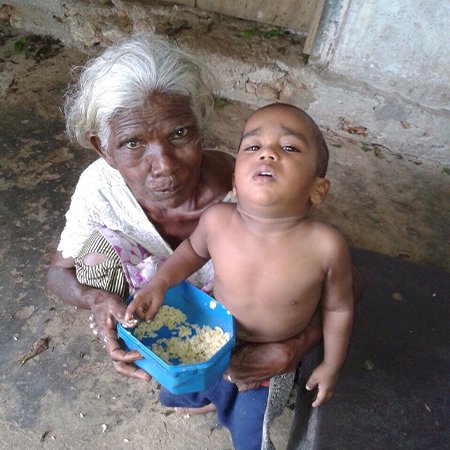
In 2003, Sri Lanka's parliament passed the Grant of Citizenship to Persons of Indian Origin Act, allowing all persons of Indian origin who have lived in Sri Lanka since 30 October 1964, and their descendants, to obtain Sri Lankan citizenship. However, as mentioned in the Immigration and Refugee Board of Canada report LKA102017, presenting documents such as a parent’s birth certificate is a challenge and thus impossible for most to obtain citizenship.
How we are fixing for once and for all
In a letter from Abraham Lincoln to Horace Greeley written on August 1862, Lincoln justifies his decision to end slavery:
“If I could save the Union without freeing any slave I would do it, and if I could save it by freeing all the slaves I would do it; and if I could save it by freeing some and leaving others alone I would also do that. What I do about slavery, and the coloured race, I do because I believe it helps to save the Union; and what I forbear, I forbear because I do not believe it would help to save the Union.”
Lincoln’s decisions to free the slaves laid a concrete foundation for a country that now thrives on freedom, creativity, the aspiration to ‘dream big’ and achieve success for its citizens, irrespective of the colour of one’s skin or nationality. In Sri Lanka, we believe the time has come to end this modern-day slavery, once and for all. We firmly believe that the Indian Tamils who consists of 4.2% of the population and haven’t been given the chance to experience life for the last 150 years can transform Sri Lanka to the next level. This transformation will create a culture that thrives on equality, kindness, and freedom.
The elderly Indian Tamils of Sri Lanka, after years of repression have lost faith that the system of cheap labour can change, so it will be a great challenge to change their point of view. However, there is tremendous opportunity to make a positive impact on the lives of Indian Tamil children in Sri Lanka.
We are going to take up the challenge to restart the “Lorry Body School” and more than ever, focus hard on truly transforming the children of the Indian Tamils of Sri Lanka. Our plan is to start the school with 5 children and add students until all Indian Tamil children in Sri Lanka are reached. We will work hard to ensure that these children receive the best education that one can receive in the world. And as an outcome, we expect that these children will add tremendous value to Sri Lanka and to the world.
Rather than investing and participating in various giving back projects, all our family start-ups [Ant Commodity – fixing commodity trade, Early Is Good- building sensors for early cancer diagnosis, and Diyadola Resort] have committed to the “Lorry Body School.” The success of our own entrepreneurial ventures will also be measured through the accomplishments that will emanate from the “Lorry Body School” project—for a better and more prosperous Sri Lanka!
